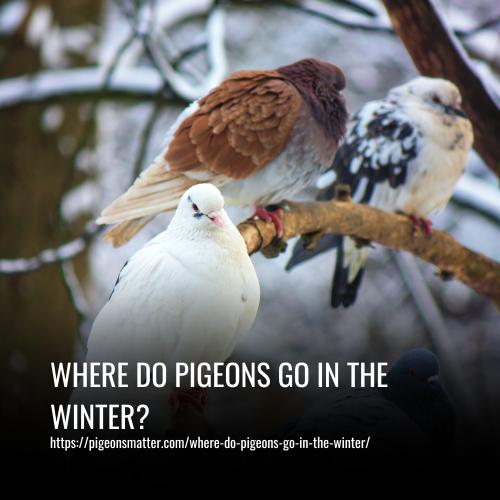During the winter, most birds migrate to warmer climates for survival, but pigeons are an exception. They have traits that allow them to adapt and survive in cold weather. They find refuge in buildings such as attics, garages, and vents, where they can huddle together and stay warm and dry. However, Scandinavian wood pigeons may migrate to warmer regions.
Pigeons also make use of natural environments like trees, rocks, and thick vegetation to build their nests, which they line with feathers, leaves, and twigs for extra insulation. On the coldest days, pigeons form large flocks to share body heat and conserve energy, often perching on building sides or tree branches.

What Do Pigeons Do During Winter?
Pigeons will stay in areas where they find easy access to food and water. They will also stay in areas with a warm winter shelter, such as under tunnels, bridges, and ledges of buildings. During the winter, pigeons will also seek shelter under shrubs, trees, and other vegetation.
- Seeking shelter in warm places: Pigeons will change the location of their nest if it is not comfortable enough, and rely on man-made structures, including ledges of buildings, solar panels, and tunnels.
- Staying in groups: To keep each other warm, pigeons form flocks, enabling them to conserve body heat and increase their chances of finding food.
- Relying on humans for food: Pigeons eat a variety of foods, but in winter, they mostly rely on the foods humans provide, such as nuts, seeds, or bread crumbs.
- Lowering activity rate: To lower the waste of energy, pigeons become less active during the cold months and stay put in areas in flocks, enabling them to stay comfortable and warm.
How Do Pigeons Survive the Winter?
Pigeons survive the winter by regulating their body temperature. They tuck their feet and heads in, stick their feathers down, and crouch to conserve heat. In extreme cold, they can constrict blood flow to prevent heat loss. This allows them to stay warm and comfortable.
Additionally, pigeons stick closely together in groups to share body heat and stay warm on cold nights. This behavior helps them survive the winter by efficiently managing their body temperature and staying cozy in harsh weather conditions.
Where Do Pigeons Sleep in the Winter?
Pigeons prefer sleeping on flat surfaces, unlike most birds that prefer rounded perches. This behavior remains unchanged during the winter months. You can find pigeons sleeping on the undersides of bridges, building ledges, and barn beams.
In rural areas, pigeons may sleep in shrubs, trees, or other vegetation. They may also roost in agricultural buildings, especially if they have easy access to food. This preference for flat surfaces and varied sleeping locations makes pigeons unique among birds, especially in the winter.
How Pigeons Survive in New York the Winter
Pigeons in NYC do not migrate like many other bird species. Instead, they have adapted to survive the winter in the city. Their biology and dependence on human populations enable them to easily endure the colder months.
Winter can be a season of population increase for pigeons in NYC. They can find food and shelter in urban environments, and their ability to roost and nest on buildings and other structures provides them with insulation from the cold.
Additionally, pigeons are resourceful in finding food scraps left behind by humans, further helping them to survive the winter. This combination of factors allows pigeons to thrive in NYC throughout the winter, making migration unnecessary for their survival.
Do Pigeons Get Cold In The Winter?
Most pigeons in colder climates roost on buildings and nests, which act as a natural thermostat. When it cools down outside, they can maintain their body temperature by huddling together and sharing body heat.
1. Feathers Provide Insulation:
Pigeons have a dense layer of feathers that trap heat close to their bodies, keeping them warm even in the coldest temperatures.
2. Heat Production Through Metabolism:
Pigeons have a very active metabolism that generates internal warmth, further bolstered by specialized blood vessels in their feet that capture additional heat.
3. Tucking Feet and Head Under Feathers:
Pigeons fluff up their feathers and tuck their feet and heads under them to reduce heat loss and create an additional layer of insulation.
4. Seeking Warm Roosting Areas:
Pigeons seek warm places to roost in during the winter, often congregating in large groups in sheltered areas such as under bridges or in city buildings to take advantage of the warmth generated by the surrounding structures.
How Pigeons Thrive Throughout Winter
Pigeons in colder climates have adapted to survive the winter by huddling together and sharing body heat. When it cools down outside, they can maintain their body temperature by huddling together and sharing body heat.
1. Urban Habitat:
Pigeons thrive in warm urban areas that are abundant in food, providing them with the necessary resources to survive the winter months.
2. Talented Nest Builders:
These birds are skilled at building nests, and they tend to settle in sheltered and warm areas, which allows them to protect their young from the harsh winter conditions.
3. Unique Feeding Ability:
Pigeons can feed their young by producing ‘crop milk,’ nourishing and ensuring the survival of their offspring even in the winter months.
4. Year-round Activity:
The combination of their urban habitat, nesting skills, and unique feeding ability allows pigeons to continue with their relatively normal activities throughout the year, making them one of the few species that can produce young during the winter.
What Do Pigeons Eat In The Winter?
During the winter, pigeons rely on a variety of survival foods. Their primary sources of nourishment are seeds such as sunflower, millet, and wheat, which provide necessary carbohydrates and fats. Cracked corn is also essential during this period, as it is high in protein and energy.
Additionally, pigeons consume fruits like berries and apples, as well as leafy vegetables, to gain vitamins and minerals. They also feed on food scraps and urban waste, such as leftover bread, crackers, and grains, which provide enough energy to survive until better food sources become available.
Why Do Pigeons Do So Well in New York in the Winter?
Pigeons do well in New York in the winter due to their ability to survive lower temperatures and the city’s environment. Their downy fluff helps insulate them, allowing them to survive temperatures as low as -40 degrees Fahrenheit.
Pigeons need to eat voraciously throughout the day to maintain their body heat at night, but they are more than capable of surviving a New York winter as long as they do so. The urban heat island effect in NYC keeps the city a few degrees warmer than surrounding areas, making it more comfortable for pigeons to scavenge for food.
Additionally, the city remains active in the winter, providing easy food access for pigeons from trash and food scraps. Plentiful shelter in areas like attics, roof vents, and wall voids also helps pigeons survive the winter.
Do Pigeons Hibernate in Winter?
No, pigeons do not hibernate in winter. While many other species hibernate due to limited resources and harsh conditions, pigeons remain active throughout the winter. They rely on humans for food and resources, which is why they are commonly found in areas with human activity, such as rooftops and public parks.
In areas with little human activity, pigeons are less common. This active behavior in winter sets pigeons apart from species that hibernate or go dormant during the cold season.
Are There Any Specific Places That Pigeons Migrate to in the Winter?
Pigeons do not migrate in the traditional sense in winter like other birds. They do not take mini vacations to other locations. Instead, they will stick around in an area as long as they find easy access to food and water.
They also prefer to be in an area with a warm winter shelter. So, for pigeons, migration might be from one shelter to another in the same area, rather than from one location to another. In short, pigeons will try to be in warmer areas in winter and do not migrate to specific places.
Where Do Pigeons Go When It Snows?
When the weather turns cold and snowy, pigeons will seek shelter in microhabitats such as thick hedges or the downwind side of a tree. These spots protect from the snow and give the birds the warmth they need to survive.
Pigeons will also fluff up their feathers when it is snowing, which helps them trap body heat and stay warm. So, when it snows, pigeons will find these sheltered spots to hunker down and stay safe from the cold and snow.
Where Do Wood Pigeons Go in Winter?
Some wood pigeons, such as those from Scandinavia, are migratory and will pass through different geographic locations throughout the year, including various areas of the UK. However, resident wood pigeons in the UK do not migrate and will stay put throughout the winter.
Like regular pigeons, wood pigeons will seek shelter in dense vegetation, such as hedgerows, to find protection from the cold and wind. Therefore, in winter, wood pigeons can be found in the UK as both migratory birds passing through and resident birds seeking shelter in dense vegetation.
What Type of Environment Do Pigeons Prefer in the Winter?
Pigeons prefer urban environments with constant human activity in the winter, as it provides them with warmth and easy access to food. They often seek shelter under tunnels, bridges, and ledges of buildings, where they can find warmth and food waste from areas like food vendors and restaurants.
In more natural settings, pigeons seek shelter in shrubs, trees, and other vegetation, relying on natural food sources such as berries, insects, and seeds. This combination of urban and natural environments allows pigeons to survive and thrive during the harsh winter months.
FAQs
Pigeons are mainly granivorous, meaning that they eat mostly seeds, but they will also eat other things like insects and fruits. In the winter, when food is scarce, they will eat just about anything they can find.
Pigeons keep warm during the winter by fluffing up their feathers. This helps to trap heat and keep the pigeon warm.
No, pigeons are generally non-migratory birds. They adapt to colder temperatures by seeking sheltered areas like ledges, attics, or buildings to stay warm.
Pigeons have adaptations such as dense feathers that provide insulation, and they fluff up to trap heat. They also alter their behavior, seeking warm spots and conserving energy during colder months.
Pigeons do not hibernate. Instead, they remain active throughout the winter, albeit with some behavioral changes to cope with the cold.
Yes, pigeons require food year-round. In winter, finding food might become more challenging, so they rely on food sources in urban areas, including seeds, grains, and scraps left by humans.
Yes, pigeons tend to roost in sheltered areas during winter to protect themselves from harsh weather conditions. Places like building ledges, under bridges, or inside attics are commonly chosen roosting spots.
Providing food like birdseed or grains can be helpful for pigeons during winter when natural food sources may be scarce. However, it’s essential to avoid disrupting their natural behaviors or causing disturbances in urban areas. Offering shelter is not necessary as pigeons are adept at finding their own protected spaces.
Conclusion:
The mystery of where pigeons go in the winter has been revealed, and it’s a fascinating journey! These resilient creatures have developed incredible adaptations to survive the cold and find warmth and sustenance.
So the next time you see a pigeon perched on a snowy rooftop, remember that they are true winter warriors, navigating the world in their unique way. Appreciate these often overlooked birds and their remarkable ability to endure and thrive in the harshest seasons.


